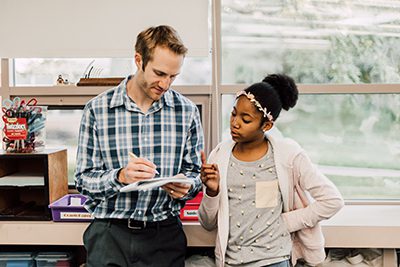September 30, 2019
 Parent-teacher conferences are one of those unique interactions that can still cause butterflies, no matter your age, grade level, or how many you’ve attended. These face-to-face forums to discuss performance and progress can trigger a mix of emotions, going to the heart of parent concerns about whether their child is “on track” academically, emotionally, and interpersonally.
Parent-teacher conferences are one of those unique interactions that can still cause butterflies, no matter your age, grade level, or how many you’ve attended. These face-to-face forums to discuss performance and progress can trigger a mix of emotions, going to the heart of parent concerns about whether their child is “on track” academically, emotionally, and interpersonally.
While parents often hold their breath during conference season, it’s important to let that anxiety go and embrace the open dialogue of school conferences. The National Education Association (NEA) explains that “To get the most out of parent-teacher conferences, parents need to take an active role in their child’s education year-round and come prepared to discuss how their child can reach their full potential.” The NEA recommends that parents take time to prep before conferences, including taking notes about any questions you have related to your school’s programs or policies, insights you’d like to share about your child at home and significant events in your child’s life, and your own reflections on your child’s progress.
Another assurance from the NEA is that conferences are a safe place to have transparent conversations about concerns—teachers welcome and expect those frank conversations year-round, and especially during conference time. Parents should feel comfortable bringing up important topics, such as your child’s strengths and weaknesses, their connections with other students, and whether they are working to their ability in the classroom.
Reading Rockets, an award-winning national education project offered by WETA, the public broadcasting station in Washington, DC, shared these specific questions at understood.org as a roadmap for parents to start discussions about their child during conferences:
- What is my child expected to learn this year?
- How will this be evaluated?
- What are my child’s strongest and weakest subjects?
- What are some examples of these strengths and weaknesses?
- Does my child hand homework in on time?
- What types of tests and evaluations will my child take this year?
- How are my child’s test-taking skills?
- Is my child participating in class discussions and activities?
- How are my child’s social skills?
- Does my child seem happy at school?
- Have you noticed any unusual behaviors?
- Has my child missed any classes other than excused absences?
- Do you think my child is reaching his or her potential?
- What can I do at home to help support my child’s academic progress?
 Bringing Children Into The Conversation
Bringing Children Into The Conversation
As students move into the Middle School grades, it’s a developmentally important time to include them in conferences. In a PBS spotlight on parent-teacher partnerships, Diane Levin, Ph.D., professor of education at Wheelock College, advises that “a positive parent-teacher relationship helps your child feel good about school and be successful in school. It demonstrates to your child that he can trust his teacher, because you do. This positive relationship makes a child feel like the important people in his life are working together.”
Strong parent-teacher relationships are a hallmark of the Mounds Park Academy experience, with ongoing communication between parents and teachers cultivated year-round. The Lower, Middle, and Upper Schools host two scheduled conferences annually for all students. Lower School conferences typically occur between parents and their child’s primary teacher; in Middle and Upper School, students are expected to attend conferences with their parents and be active participants in the conversation.
A Wall Street Journal feature on student-led conferences spotlighted research that shows how including students in conferences “reflects a growing emphasis on what educators call personalized learning—tailoring students’ work to their individual needs and interests, and pressing them to take responsibility for mastering agreed-upon skills. The aim is to spawn lifelong learners who can adapt nimbly to change.”
That’s a common theme at Mounds Park Academy, one that runs through school conferences and throughout the entire school community. “Small class size ensures that students are known by teachers and enables students to have confidence that teachers care for them as individuals,” says Dr. Bill Hudson, head of school. “With a low student-teacher ratio, it is nearly impossible for any student to fall through the cracks at Mounds Park Academy.”
Learn more about it: Parent-Teacher Conferences
- The Harvard Family Research Project offers this checklist to help prepare for conferences.
- Five strategies for successful conferences, from an educator’s point of view.
- Perspectives on building strong parent-teacher relationships, from Working Mother magazine.